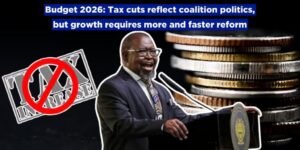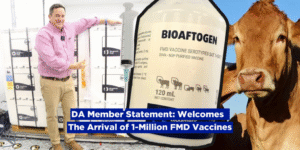Madam Speaker,
We’ve just witnessed something extraordinary.
The Leader of the Opposition, the leader of the ANC in this City, has just resigned from the ANC and has joined the DA.
This is an unprecedented moment. I’m not aware this has ever happened before. We’ve just witnessed history being made.
I really warmly welcome Cllr Majingo to the party that is growing and winning more support from every community in this city.
I want to quote the very powerful words of Cllr Majingo’s statement:
“After careful consideration, I have come to realise that my personal values and principles are now more aligned with those of the Democratic Alliance (DA).
I am committed to their pursuit of clean governance and economic growth. I am increasingly impressed with their commitment to deliver for poor residents and the unemployed.”
Thank you for those powerful words, Councillor.
Now I really want to speak directly to all of the current and former ANC voters in Cape Town who feel exactly the same as Cllr Majingo does.
We all want the same things: opportunities for our children, jobs, a future that is better than the present. In Cape Town, we are building that future. You can see it with your own eyes. You can feel it when you talk to people.
This party, this government in Cape Town is deeply committed to improving the lives of every resident of this city, and more and more residents across our city are noticing this.
The Leader of the ANC in Cape Town is now supporting the DA. I invite you to do so too.
Come and join us.
You are all welcome!
Speaker,
After such an extraordinary start and before I get into the details of the Budget, I would like to recognise a couple of people.
Firstly, two new councillors have joined us – namely, Councillor Andrew Arnolds representing the EFF, and Councillor Nasmie Jacobs of the CCC, and I welcome them to Council.
Then, a long serving colleague of our, Cllr Grose, is retiring today and leaves with our warm affection and thanks for her 14 years of service.
You will have seen that it is my practice here to take a moment to recognise aldermen who are retiring, regardless of which party they’re from, after spending most of their adult lives serving Cape Town.
Today I wish to honour a long-standing colleague of ours who has decided to call time on his career, and who joins us for the last time today, Alderman Paddy Chapple.
Alderman Chapple began working for Council in 1980, and was elected to Council in 2000. He has worked across the length and breadth of this organisation, doing fascinating and sometimes obscure jobs, always showing his unique ability to connect with anyone and everyone, and maintaining his trademark naughty sense of humour.
He has enjoyed a long and colourful career, the tales of which will long be spoken of here.
He is himself a wonderful raconteur who can regale an audience with hilarious tales of every risible person who has occupied these offices, and his storytelling is always helped by the fact that he is also extraordinarily well-read.
For decades – long, long before we started holding First Thursdays – Alderman Chapple has been holding the original open government sessions on his front stoep most evenings, where a regular cast of local Obs and Woodstock characters wander in and out, share some cold ones, and solve all the problems of the world. I’ve had the memorable pleasure of joining one of these ‘on the stoep’ sessions, and I have no doubt they will continue now that he is retired, probably starting earlier and ending later.
Alderman Chapple, we greet you with the Irish blessing, “May the road rise to meet you”. Enjoy your retirement!
Colleagues,
The other special guest here with us this morning is a firefighter from Mitchells Plain called Michael Samuels, along with his wife Valencia and daughter Keisha. Firefighter Samuels is stationed at the Mitchells Plain Fire Station, and he did something earlier this month that changed the lives of several Capetonians forever.
In the early hours of a Thursday morning, a frantic aunty rushed into the fire station with her little nephew, a five-month-old baby boy, Isaiah Scala, who was struggling to breathe. Moments later his mother, Cachet, also arrived at the scene, having turned around on the way to work when she got the call that something serious was wrong with little Isaiah.
Michael immediately took control of the situation, inspected the little guy’s airway and proceeded to dislodge an object that was blocking his breathing, effectively saving his life.
I am sure Isaiah’s mother, Cachet, has already thanked Michael several times for his heroism, but I would like to thank him too, today, on behalf of the people of Cape Town.
Thank you for remaining calm in the situation, thank you for remembering your training, and thank you for being a true hero to that little boy and his mom.
Madam Speaker,
It is with great excitement and optimism that I address you this morning to table this administration’s fourth Budget.
Excitement, because we are making record investments in this Budget in areas of delivery that will have a profound impact on the lives of many Capetonians.
And optimism, because we are now at the stage of this term of office where we can see all the projects under construction, and the work lined up, and we know we are on track to deliver on every pledge we made just over three years ago.
Crafting any budget – whether it’s for a city, a business or your household – is a tricky balancing act.
You need to find a balance between the limitations on your sources of funding – in our case, rates, tariffs, grants, borrowing and other revenue we collect – and the necessary investments needed for a fast-growing city like Cape Town, which is about to cross the five-million mark to become our country’s most populous.
You also need to find a balance between the many competing priorities in the city, many of which make convincing and competing cases for increased funding.
It cannot be said that more basic services takes precedence over more safety, or that water security is more important than our energy security.
And yet we are faced with decisions that require of us to weigh these priorities against each other.
In the case of our city, the biggest balancing act is between our bold plans to build the Cape Town of the future – the city that we know will be able to handle the substantial growth that is headed our way – and the need to shield our most vulnerable residents from the enormous financial pressures that make their daily lives very hard.
We continue to be guided by our higher purpose of doing that which will help grow our economy in ways that lift more people into work and out of poverty over time.
And we remain committed to doing so with the utmost respect and understanding for our ratepayers, who are all experiencing their own pressures in balancing their own household budgets every month.
It is a complex and laborious job that involves many rewrites and tweaks until we are certain we have found the balance that gets the absolute maximum benefit out of every Rand at our disposal.
I am eternally grateful for the competent and hard-working men and women who spend these months in the build-up to the Budget agonising over every tiny detail to make sure we get it just right.
I will mention in particular the names of our budget team. Kevin Jacoby, our Chief Financial Officer, is the driving force behind each of the four Budgets tabled in this term – today’s included – and is a resource other metros can only dream of.
Our Director: Budgets, Carl Stroud, and his superb team of Zukiswa Nqanqali, Sumaya Rinquest and Karen Fourie, and all aided by our MayCo Member Siseko Mbandezi. Thank you to all of them.
To everyone who worked long hours these past months to produce this Budget, thank you. It is an exceptional document that reflects the City’s value of care above all else. And it will go a long way towards helping us realise our vision of building a City of Hope for all Capetonians.
At the start of our term, we made no secret about our ambitions. We announced the biggest infrastructure pipeline ever undertaken by a city government in South Africa – R120bn of projects over a ten-year period, mostly in the critical water and sanitation space – and we committed to targets that would require of us to ramp up the pace of these projects for each new year of the term.
Each of the budgets in this term so far has seen new capital expenditure records set, as we began to pull clear of every other metro in South Africa.
Today we table the fourth – and second last – Budget of this administration. And we have called this the “Invested in Hope” Budget.
Because that is what we are now – we are fully invested in building a city of hope for all – as we approach these final two years of this term of office.
Speaker,
This budget contains Cape Town’s planned infrastructure investment over three years – at R39,7bn –more than the three Gauteng metros combined, and will create over 130 000 construction-related jobs. Crucially, a full 75% of this investment directly benefits lower income households.
Our record-setting investment in Cape Town’s water and sanitation infrastructure gets another R5bn boost this year – more than double the R2.3bn we spent on water and sanitation in our first budget in 2022.
Over the next three years R16,6 billion is allocated to water and sanitation. Just this portion of our capital budget is more than the entire capital budgets of Tshwane and Ekurhuleni combined.
In public transport, over the three-year MTREF we’re spending around R4,5bn on our MyCiti expansion. This is the biggest project of its kind in South Africa which, once completed, is going to improve the lives of so many people along this route.
We also march ahead on our mission to a decentralised energy future that is less Eskom reliant, with R5bn of investment over the medium-term framework in our city’s electricity grid.
By making unprecedented investments in our city’s infrastructure; in sustainable water, electricity and services; in public transport and roads; in our community assets like parks, libraries, sports and recreation facilities; and also importantly in the safety net of care extended to our poorest residents – we are now fully invested in delivering that City of Hope, not for some, but for all.
As with each of our previous three budgets, there are certain areas of investment that stand out and speak to our priorities and pledges to the public.
This year, that stand-out investment is without a doubt the investment we are announcing today on safety and security.
I am delighted to announce today that we will deploy over 500 new officers across every community in Cape Town.
This means that every ward in the city will now have a permanent deployment of officers for the first time.
We are going to post officers in neighbourhoods where they will be stationed permanently, and where they will get to know that community well. They will get to know the challenges of the neighbourhood, they will get to know the problem buildings in the area, and they will get to know the residents themselves.
This kind of personal policing, where relationships and trust are built with specific officers, can only lead to more positive outcomes, and I look forward to seeing its impact once deployed.
These new officers are over and above the 400 new officers we’ve added to the ranks of law enforcement and metro police since the start of this term.
As they say, but wait…there’s more.
You will remember three years ago we funded a first small unit dedicated to doing armed escort duties.
Since then, attacks on frontline service staff and on our construction sites have skyrocketed as extortion mafia have only grown bolder and more brazen.
We are sadly spending hundreds of millions of rands each year in armed security with private security companies. This is money that should be spent on basic services, or more infrastructure, but instead it must be spent on simply guarding waste collection trucks, or sewer response teams, as they try to deliver basic services in communities without harassment and attack.
Time and time again we hear the same feedback from our teams – when there are blue lights there, there are no problems, no attacks.
So I am also pleased to announce that in this budget we are now insourcing some of these security costs, and creating a much larger dedicated escort unit of 220 new officers.
We hope this will put a stop to attacks on our frontline service staff so that we can better service the public, especially in informal settlements.
With today’s two announcements of over 700 new officers, plus the 400 we have already funded and deployed since the start of this term in office – this means we have funded over 1100 new officers since the start of this term.
This is by far the biggest investment ever in making Cape Town safer.
Our total safety and security budget is now a massive R6,7bn for the coming year.
This really demonstrates our commitment to help SAPS fight crime and to do all we can to make Cape Town safer.
Already with our major LEAP deployments to our metro’s most violent crime-impacted suburbs, we are seeing major successes in taking guns and drugs off the streets.
With our special CBD deployment, we saw big increases in policing action to combat crime, and that has inspired us to make this investment in dedicated officers for every single ward.
We are determined to make every single rand of our safety budget work as hard as it can to remove guns and drugs from our communities, and to arrest the perpetrators of crimes.
And when we do finally get the devolved policing powers we have been asking for, our well-trained officers will be in a position to investigate and build solid case dockets that will see these perpetrators taken off the streets for long periods at a time.
We will continue to advocate for this devolution from national government in the form of simple regulations issued under the SAPS Act.
Speaker,
I am also pleased to announce major tariff reforms today that will bring relief for lower income households when it comes to electricity, water, and sanitation bills.
While NERSA approved a 12,74% increase for Eskom and an 11,32% Eskom increase to municipalities, City of Cape Town customers will see just a 2% increase on average.
This has been made possible by discontinuing the contribution to services other than electricity, embedded in the cost of each electricity unit.
For the past three decades, the electricity tariff has included a portion – around 10% – which goes towards various other City services, such as area cleaning, which are otherwise largely funded by property rates. This system was initiated when electricity was relatively cheap, and a much smaller portion of the monthly household bill.
But this will now be discontinued, following a comprehensive review of the City’s electricity tariff structure.
Now that we have seen two decades of exorbitant Eskom electricity price increases – where Eskom electricity now costs a full 400% more than it did in 2004 – there is no more room in the electricity tariff to accommodate a contribution to other services.
And so we have now done away with this practice to assist households with the rising cost of electricity, which is a disproportionate part of monthly household expenses.
Cape Town has also made unprecedented moves for any metro to offer protection to our Lifeline electricity customers.
You will remember that in 2023 we raised the number of units that Lifeline customers can buy at the cheaper, subsidised rate from 350 to 600 units a month.
What this means is that Lifeline customers who use 600 units a month will pay more or less the same in this coming year as they did three years ago.
Of the metros, Cape Town stands alone in this support measure.
Lifeline customers will further pay no fixed charge, while City customers on the Domestic Tariff will make a proposed fixed monthly contribution of R59,90 to ensure sustainable electricity services.
Speaker, I must pause to mention that, in the run up to this budget tabling, we have seen misleading comparisons of Cape Town and Joburg tariffs by a Councillor from GOOD.
Now, I don’t think you can even compare Cape Town and Joburg anymore, we’re pulling so far ahead.
But for the record, the new fixed charge Joburg introduced on their Domestic-equivalent tariff last year is R230 per month. This is four times higher than the fixed portion of Cape Town’s Domestic tariff. Four times.
It must also be noted that the same GOOD councillor also mistakenly claimed Cape Town’s annual increase will be 9,32% for 2025/26 – no, it will not Speaker.
Let me repeat: Our electricity tariff increase is just 2% on average compared to Eskom’s 11,32% increase to municipalities.
Now Speaker, I turn to another big reform which will especially benefit lower income households.
There are two key changes to fixed charges for water and sanitation.
The first change is that fixed water and sanitation charges will now be determined by the value of your property and not connection size, providing welcome relief for households at the lower end of the income scale.
In the past, households were charged a particular fixed charge for water based on the size of their water connection – for most homes this was a 15mm connection.
This also meant that a well-off household and a low-income household who had the same connection size paid the same fixed charge. Now this fixed charge will be determined by the respective property values, resulting in a saving for the lower income household.
The second key change is that sanitation, which used to only be an estimated charge based on the volume of water usage, will now include a fixed charge.
This fixed portion will be offset by a reduction in the volumetric tariff. So the overall cost to the household remains the same, only the structure of the tariff changes.
These latest changes will enable infrastructure investment into the future and sustainable service delivery, while offering greater protection to our most economically vulnerable residents.
Regarding waste management in Cape Town, there is a change in how the City charges for waste services which will reflect on ratepayer’s bills.
Previously only refuse removal was explicitly shown on the bill. Now ratepayers will see both refuse and city-wide cleaning reflected explicitly on the bill.
This is not an additional or new expense to customers: the removal of the electricity contribution to rates fully buffers the financial impact of the new City-wide Cleaning tariff.
The City-wide Cleaning tariff will therefore not be a new charge, but merely a change in the method of how City customers contribute to the funding of this service.
Indeed, most consumers will still be slightly better off after the change, even if only by a few rands a month.
Waste collection continues to be funded by its own tariff, which increases by 7,36% for 25/26 as the City continues to focus in particular on improving waste and cleansing services in areas with lots of backyarders and in informal settlements.
Madam Speaker,
We simply cannot speak of a City of Hope until every Capetonian has access to dignified sanitation services.
When it comes to investments to improve service delivery basics for Capetonians, this Budget has plenty of good news.
Already, our City has a reputation for getting things done quickly and efficiently.
The constant flood of positive reports from residents praising our leak repair teams, or our teams who go out late at night to fix electricity faults never fails to impress me.
That makes me proud to be a part of this team. We want to do even more to get the basics right for residents, showing that Cape Town can be that beacon of hope that decline is not inevitable.
The experience of other metros need not be ours – we can have a working city without dirty CBD’s, potholed roads, broken traffic lights, and community facilities in decline.
A total of R88m annually will go to our new Highway and CBD cleaning initiative, helping to keep Cape Town clean, ensuring our metro is welcoming, presentable and business-friendly.
Over the same three-year period, we are investing a billion Rand in street lights and traffic signals, and just over a billion Rand to purchase more refuse removal vehicles and plant.
We’ve also set aside R2,6bn for road maintenance, R687m for road upgrades and R294m for various congestion relief projects over the three-year MTREF.
We’ve set aside a further R123m for upgrades to sports facilities, R66m to upgrade our city’s recreation hubs and community halls, and R171m for parks and public spaces.
Libraries get R191m in this budget for upgrades and books, and our beautiful and much-loved public swimming pools will get more than R95m to ensure that they look pristine and operate smoothly.
Cape Town’s Safe Space shelters – a unique investment among SA’s cities in helping the homeless off the streets – will get R200m over the three-year medium-term framework to expand and operate these dignified shelters to more parts of the city.
Madam Speaker,
Already, Cape Town is streets ahead of the other metros when it comes to the social relief we are able to offer indigent and economically stressed residents.
And that gap will continue to widen in this Budget.
In the context of all these investments, we hope ratepayers will understand the slightly above-inflation property rates increase of 7.96% to cover the major growth in more policing resources for a safer Cape Town – accounting for a third of every rand paid in property rates – as well as the major infrastructure investments in roads and community amenities.
This is all literally being invested straight back into our plan to safeguard our city and its residents.
Even with this increase, Cape Town still has the lowest property rates for residential, commercial and industrial properties, as calculated with the nationally-applied rate-in-the-rand formula.
In fact, even with the 2025/26 increase applied, Cape Town’s residential rate-in-rand remains below last year’s levels in all other cities.
For the current General Valuation (GV) term, there is also a Rates relief increase of 50% for all residential properties under R5 million, with the first R450 000 of property value Rates-free, the highest of all metros.
Not only do Capetonians see real results from their rates contributions, and higher property value growth than anywhere else, they also get the best bang for their buck on the property rates itself.
We have also, once again, funded the most comprehensive social package in the country, valued at R5,2 billion for 2025/26, up from R3,75 billion in 2022/23. This includes R2,4 billion in rates rebates and R2,8 billion in indigent relief.
We continue to offer the highest allocation of free water at 15Kl and free sanitation at 10Kl of all metros in South Africa, and the widest criteria for Lifeline Electricity as mentioned earlier.
That is what you can achieve if you prioritise correctly, and if you leverage the power of the country’s most responsible and loyal ratepayers for good.
These are just some of the many highlights of this “Invested in Hope” Budget, and I urge residents to read the full document.
What you will find is a budget that carefully balances the critical goals of investing in and building a city of the future, and also extending a hand of care and financial support to Cape Town’s vulnerable residents.
Guided by this Budget, we are on course to deliver what we pledged we would just over three years ago: A City of Hope for all who live here.
I hereby table the City of Cape Town’s 2025/26 Budget, and open it for public participation.
Thank you.




